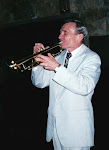With Thanksgiving a few days away, this is a perfect time to review two timely classics from Louis Armstrong's golden Decca period.
These wonderful sides of 1935-46 are now available from Mosaic records, I first encountered them on a wonderful Decca lp, Rare Items in the late 60s. At that time the Decca big band sides had been pretty much ignored. The Rare Items lp along with Dan Morgenstern's consumate liner notes helped to bring this prolific period of Pops to the jazz public. When Louis signed with Decca in 1935, he was leading the Luis Russell band and would continue to into the 40s. The band was full of many of Pops' New Orleans pals such as Albert Nicholas, Red Allen, Pops Foster, Paul Barbarin and Russell himself. Other standout players included Charlie Holmes, J.C. Higginbottom, Jimmy Archey and the great Sid Catlett (one of Louis' favorite drummers).
These wonderful sides of 1935-46 are now available from Mosaic records, I first encountered them on a wonderful Decca lp, Rare Items in the late 60s. At that time the Decca big band sides had been pretty much ignored. The Rare Items lp along with Dan Morgenstern's consumate liner notes helped to bring this prolific period of Pops to the jazz public. When Louis signed with Decca in 1935, he was leading the Luis Russell band and would continue to into the 40s. The band was full of many of Pops' New Orleans pals such as Albert Nicholas, Red Allen, Pops Foster, Paul Barbarin and Russell himself. Other standout players included Charlie Holmes, J.C. Higginbottom, Jimmy Archey and the great Sid Catlett (one of Louis' favorite drummers).
Louis' own playing and singing had reached a maturity combined with his earlier virtuoso side. This combination gave us some of Pops' most sublime sides, but he could still give the listener shivers with his uncanny phrasing and mastery of the trumpet's high register. His singing on ballads revealed that mellow crooning approach he started in the early 30s. These two sides are perfect examples of this type of playing.
Thanks a Million by Arthur Johnston and Gus Kahn comes from a 1935 Dick Powell film of the same name. Also featured were Fred Allen and Paul Whiteman's Orch. including the Teagarden Bros. and Frank Trumbauer.(Whiteman recorded his version for Victor in July '35) The tune was also recorded by Jimmy Rushing and was a favorite of Ruby Braff and Bobby Hackett. Bobby performed it at the 1970 Newport Salute to Satchmo.
Thankful by Sammy Cahn and Saul Chaplin doesn't seem to have come from a film or show. I don't think anyone else has recorded it since Louis. Now on to Pops' beautiful renditions of the tunes.
Thanks a Million (12/18/35) No intro, Louis comes right in with his crisply burnished sound and a lovely exposition of the melody (nobody could caress a melody like Pops). On the second half chorus Louis goes up high but still keeps the serene mood.The band brings Pops into his vocal and sounds a bit ragged, it took the Russell band a while to click with Louis but they eventually became a crack backup band. Louis' tender, crooning vocal is backed by nice Russell piano, Pops throws in a "mama" and Russell modulates into Louis' last half chorus. This ending is full of his majestic, operatic sound with the classic high note ending. Great Stuff!
An alternate take exists and shows subtle variations on Pops' opening chorus. The vocal is still mellow and Russell's piano spots equally nice. When Louis starts his vocal you can hear him clear his throat. The ending is equally impressive. A nice contrast.
An alternate take exists and shows subtle variations on Pops' opening chorus. The vocal is still mellow and Russell's piano spots equally nice. When Louis starts his vocal you can hear him clear his throat. The ending is equally impressive. A nice contrast.
Thankful (5/18/36) The band sounds so much better and the intro is solid and clean. Louis' vocal is backed by nice horn figures. This vocal like Thanks a Million is very pretty and well recorded. Pops gets a few low scat figures in, the bridge is very attractive with it's descending line. Pops Foster's bass is also very solid thruout. The band modulates to some very inspired horn by Pops. His burnished tone finds time for some lovely passing figures and he really digs in with some impressive double time figures over band stops on the bridge. The last half chorus has Pops riding over the band with great authority and nicely placed high notes leading to another classic operatic finale. A Beautiful Performance!
We can be so "Thankful" that Louis Armstrong came along to change the course of American Music and give us countless musical gems such as the above selections. They are part of the excellent Mosaic Decca Collection-MD7-243.

No comments:
Post a Comment